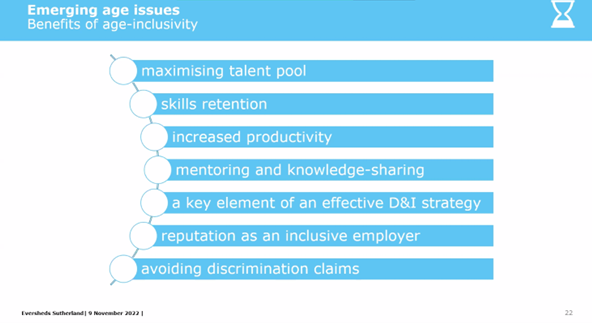Latest Employment Law Update proves very succesful
Our most recent Employment Law Update in partnership with international law firm Eversheds Sutherland (International) LLP took place on Wednesday 9th November.
Amanda Underhill, HR Recruitment Business Manager here at Ashley Kate HR & Finance, opened the session with a brief introduction outlining the session before handing over to Chloe Themistocleous, Principal Associate at Eversheds Sutherland. After giving a general market update to over 600 delegates, Chloe passed over to Abigail Powell, Employment Associate and Alexander Bevan, Associates both of Eversheds Sutherland to introduce themselves.
The rise of class actions
Alex started the session by covering the ‘rise of class actions’, stating how there had been a 267% increase in multiple case disposals between April and June 2022 compared to the previous quarter. He also stated how case receipts are greatly exceeding disposals, with 43,000 outstanding single cases still waiting for an outcome.
Most common claims were regarding issues with equal pay, unpaid holiday entitlement, worker status problems, collective redundancies, and unlawful deductions from pay packets. Equal pay issues were caused by a variety of factors from length of service/seniority level, TUPE transfers or market forces, to pay protection arrangements or simply human error/a mistake in the system.
Alex went on to identify some of the reasons behind the rise, touching on the current state of the economy and political changes as being major influences. Technological advancements now mean it’s easier than ever to raise a claim online, which is believed to have had a significant impact on the number of claims increasing.
High profile and prominent cases from huge companies such as Asda and Uber have hit the media; in Asda’s case, there were over 7000 successful claimants for equal pay issues. Alex explained how such campaigns have led more people to have confidence in making claims as a result, leading to the increase.
Chloe explained the critical components of effective case management, emphasising the importance of identifying and protecting relevant documents related to witness statements. She also pointed out how tribunal cases can snowball quickly, so the best way to manage with them, is to deal with them early on and seek legal advice where necessary. This will help avoid hundreds or even thousands of claims being filed if issues are addressed swiftly.
Following this, Chloe gave her top 5 considerations for effective case management. She suggested preparing a strategy as a starting point, ensuring the board is engaged throughout to help guide the strategy, pro-active and clear communication, appointing a strong case leader and being rigorous over evident collection/storage.
Emerging age-related workplace issues
Abigail then went on to inform attendees on the next area, which was ‘emerging age-related workplace issues’. It was highlighted that age almost feels forgotten as a protected characteristic based on the cases Eversheds Sutherland had been involved in throughout 2022.

Source: Office for National Statistics (ONS) – Reasons for leaving paid work by age group, Great Britain, 10 to 29 August 2022
Recent data from the Office for National Statistics (ONS) found a recent significant increase in those aged 50 years and over leaving the labour market. Retirement ranked highest (36%), but other reasons included stress (19%) and not feeling supported (17%) contributed significantly.
Abigail also identified research that found over a third of people in their fifties and sixties feel age is a disadvantage when applying for new roles. In 2018/19 and 2019/20 combined, there were around 2,500 cases against age discrimination; that figure rose to 15,336 in 2020/21 alone. So, what has caused such a dramatic increase?
Abigail and Chloe explained that the UK has an ageing workforce, with people working later into life. It was suggested that this, coupled with economic hardship of recent times, is behind the dramatic increase in the number of age-related claims rising.
One question from a delegate was around age discriminatory issues being present in young workers instead of just the older generation. Chloe explained how this was the case and numbers for claims among Millennials and Generation Z too, owing to the fact they are now more informed on potential discriminatory situations as a result of more media coverage.

Source: Eversheds Sutherland – Benefits of age-inclusivity across a business
Following this, attendees were informed of the benefits age-inclusivity can have for a business. These included maximising your talent pool, skills and competency retention, an increased level of productivity and the increased ability to avoid discriminatory claims.
Abigail then identified five key strategic considerations to avoid age-discriminatory issues for businesses. These included considering factors likely to attract and retain workers, to implement relationship programmes and to potentially drive a change in culture across the business.
Case law developments
Following that update, Chloe took attendees through some recent case law developments, including a particularly interesting example involving a large global client who had historic pay arrangements built into contracts as a ‘permanent feature of an individual’s contractual eligibility’, which they attempted to remove through dismissal and re-engagement of an employee.
The high court found that pay could not be unilaterally ended using this ‘fire and hire’ procedure and granted a permanent injunction against the large corporate client in favour of the claimant. However, this was lifted by the court adjudicator as it was not ‘necessary for the contract’ and ‘not sufficiently precise and clear’. Chloe explained the importance for businesses of being ‘crystal clear’ in communication and documentation to avoid similar situations occurring.
A look ahead
The final section before wrapping up was ‘a look ahead’ to the future following recent legislation and market behaviours. Chloe went through The Retained EU Law Bill, suggesting that it could potentially affect the most radical changes to British employment law for years to come.
Given recent striking from workers in the transport sector, there was also an update regarding this too. The UK government plan to introduce minimum service levels during times of strike in the transport sector, meaning some level of service will still run and allow the economy to continue. However, it is not clear on timescale and implementation of this at the present time.
If you would like to receive a copy of the recording, please email solutions@ashleykatehr.com. We hope you found the session informative and added some value and we encourage you to keep checking our website for updates regarding our next Employment Law session.




